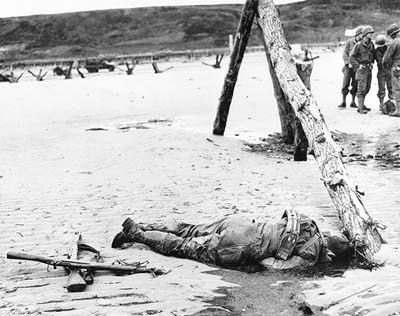Tribune wire reports
10:01 AM CDT, June 6, 2008
COLLEVILLE-SUR-MER, France-- The Battle of Normandy, which started with history’s most powerful coastal invasion force here 64 years ago Friday, is written in the white marble headstones of the American cemetery.
Names of soldiers – including 112 South Carolinians – their units, dates they died, and the American states from which they came, are etched into the smooth stones.
The dates and units track the progress of the three-month World War II campaign to drive the Germans from coastal France.
Today, ranks of crosses and Stars of David glisten even on the frequent cloudy days of northern Europe. Visitors look down on Omaha Beach, one of the landing points for invasion troops.
Located high on a bluff overlooking the English Channel, the cemetery has the graves of 9,387 soldiers, sailors and airmen who died to free Europe of Nazi domination. An additional 1,557 whose bodies were never recovered are listed on a wall enclosing the Garden of the Missing.
Here are the names, and in some cases the remains, of 112 men from South Carolina. Five died on June 6, 1944, the first day of the bloody Battle of Normandy. Others fell in the days and weeks of battle that followed.
Many who fought in that battle survived to receive accolades from their friends, children and grandchildren in the six decades since the landing. But the 112 – among 1,641 of South Carolina’s World War II casualties buried permanently in American cemeteries in Europe – never experienced that tribute.
Buried here are three of the five South Carolinians killed on the first day of battle after they parachuted into the night over Normandy with the 82nd Airborne Division.
John Lloyd Johnson Jr., of Florence, was a sergeant in the 505th Parachute Infantry Regiment. His brother, W.W. Johnson, of West Columbia, visited his grave at Normandy for the first time on Memorial Day last year.
“It affected me more than I expected that it would,” he said. “I was 15 when he died. He was my older brother, and he was my hero.”
Like so many other families who lost young men on the beaches and in the hedgerows of Normandy, the Johnsons think about what John Lloyd Johnson gave up. They remember him at special times like marriages, the birth of children – even while playing a round of golf.
Many of those who died left behind not only family, but also girlfriends and fiancees who didn’t let go of their connections easily.
“He was engaged to Jean Hill,” Johnson said of his brother. “Later, she came and talked to my mama when she was about to get married.”
Last year, Johnson was accompanied to Normandy by his son Carson, who was born many years after his Uncle John died.
Lexington attorney Wes Johnson, another of the dead paratrooper’s nephews, aims to take his children there when they are old enough to understand their great-uncle’s sacrifice.
But details of his uncle’s death remain lost in the chaos of the invasion.
“I don’t think there’s any way we’ll ever know exactly how he died,” Wes Johnson said.
All five are buried beneath white crosses in the 172-acre cemetery, given by the people of France and maintained by the American Battle Monuments Commission. After World War II, 14 American cemeteries were established across Europe for the war dead, joining eight cemeteries that contain the remains of Americans who died in World War I.
Following World War II, 39 percent of the war dead of the European theater were buried in Europe, while 61 percent were returned home for reburial at their families’ request.
But many who died in the days that followed the landing are still listed as missing in action – their remains never recovered.
They include Rupert E. Koon, of Pomaria in Newberry County. He was a technical sergeant in the 3422nd Ordnance Automotive Maintenance Company of the U.S. Army.
The support group was on a supply ship carrying ammunition that was hit by a German torpedo, said his brother, Eric C. Koon, who still lives in Pomaria.
“We didn’t know he was in the D-Day invasion until we received a telegram saying he had been killed,” said Koon, who was 15 when his 24-year-old brother died.
His brother and many more on LST 314 were never recovered because of the tremendous blast from the ammunition it was carrying.
“I’m sure the whole thing just disintegrated,” he said.
Men from all the military services engaged the Germans on D-Day, including William Crapps, of Leesville, the 20-year-old pilot of an A-26 bomber.
His plane and others attacked German submarine bases near Cherbourg, France, aiming to keep the submarines from attacking Allied ships crisscrossing the channel with troops and supplies.
Crapps, who now lives in Saluda County, said his plane was so overloaded with bombs he ran short of fuel on his return to England and had to land at a Royal Air Force Base on the coast.
He lost many friends during the battle for Normandy. In the course of the war, one-third of the crews in his unit were lost.
“I’m no hero,” he said this week, reflecting upon his role in the D-Day invasion.
“The heroes are buried under those white crosses.”
Copyright © 2008, Chicago Tribune


